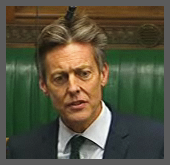 On Aleppo:
On Aleppo:
Mr Ben Bradshaw (Exeter) (Lab)
The shadow Foreign Secretary, my hon. Friend the Member for Islington South and Finsbury (Emily Thornberry), said that what is happening in Syria shames the Assad regime, Iran and Russia; it shames all of us in this House and every political party in this country. It shames the democratic world, the United States, and the United Nations, and if we do not do anything about it—let us not kid ourselves that Assad will stop here; Idlib will be next—that will be the end of the rules-based global order we thought we had achieved after the horrors of Srebrenica, with all the grave consequences that will entail for our future peace and security.
James Morris (Halesowen and Rowley Regis) (Con)
Will the right hon. Gentleman give way?
Mr Bradshaw
I will not give way for the moment.
There have been so many missed opportunities. As the former Chancellor, the right hon. Member for Tatton (Mr Osborne), said in his excellent speech, many people across the world have been calling for action against Assad since he started slaughtering his own people five years ago. In August 2013, after the international outrage at his use of chemical weapons, we had the chance, but we blew it; the Conservatives blew it, we blew it—every political party in this House blew it. The former Chancellor was absolutely right when he said that that had a direct impact on what the United States did then, with President Obama fatally withdrawing from the red line he had drawn on the use of chemical weapons, with absolutely horrendous consequences, not just now in Syria, but for the future of our world to come.
At any stage since that calamity, the Government could have come back to this House with proposals for safe areas, no-fly zones and, most recently, aid drops, but they did not. Just two weeks ago, my hon. Friend the Member for Islington South and Finsbury made it quite clear that we would support airdrops. The Under-Secretary of State for Foreign and Commonwealth Affairs, the hon. Member for Bournemouth East (Mr Ellwood), hid behind the excuse of not having parliamentary authority, but he did not even seek it, which has been a pattern of this Government over the past few years. As a desperate aid worker told the BBC yesterday, it might now be too late.
We now have the disgusting spectacle of a combination of far right and far left from around the world, united only in their contempt for democracy and human rights, celebrating what they call a “liberation”. Why do we constantly forget the lessons of appeasement, whether from the 1930s or more recently from the Balkans? Statements on Syria from Conservative Ministers have sounded just like the ones I remember from when they were dealing—or not dealing—with Milosevic as he rampaged through Bosnia. When will we understand that dictators such as Assad and Putin only respect strength and the credible threat or use of force? When will we realise that Russia’s strategy is to weaken and divide the free world and that driving the biggest refugee flows into Europe since world war two is a deliberate part of that plan? When will we admit that Putin is already achieving what he cannot achieve militarily through cyber-warfare and propaganda?
The motion that we are debating is welcome, but it is pathetic. It refers to the House considering “international action” in Aleppo. There will no international action, because there is no political will, either here or in the other countries where such will is necessary.
Mr David Lammy (Tottenham) (Lab)
Is my right hon. Friend as anxious as I am? With Putin and Russia linked to interference in the American election, with the bombing of Syria leading to a refugee crisis in Europe and with many central European countries looking inward, like we are, Putin’s expansionist tendencies and desire for a warm port should make the Foreign Secretary think carefully about the actions from this point on onwards.
Mr Bradshaw
I completely agree. We have not even begun to wake up to Russia’s cyber-warfare. Its interference in the American presidential elections is now proven. It probably interfered in our own referendum—we do not have the evidence for that yet, but it is highly probable. It will certainly be involved in the French presidential election. There are already serious concerns in the German secret service that Russia is already interfering in the upcoming elections. We have to wake up to this, but when?
Finally, the tragedy today is the tragedy of the benighted people of Aleppo issuing desperate, and probably futile, last-minute appeals for help to the outside world. The tragedy tomorrow will be all of ours for failing to stop this happening and for the consequences. Shame on us.
On Russia:
Mr Ben Bradshaw (Exeter) (Lab)
Did the Prime Minister discuss with fellow leaders interference by Russia in the political processes of western democracies, including our own, through the use of propaganda and cyber? What action is she taking to investigate what may already have happened in this country, and what is she doing to prevent it from happening in future?
The Prime Minister
I think that everyone is aware of the way in which Russia is currently operating, and of the more aggressive stance that it is taking in a number of respects. I am sure that the right hon. Gentleman would not expect me to go into detail about how we look at these matters, particularly cyber-related matters—which were mentioned earlier by the right hon. Member for Moray (Angus Robertson)—but I assure him that we take the issue of state-sponsored intervention and cyber attacks very seriously indeed.
On NHS Funding:
Mr Ben Bradshaw (Exeter) (Lab)
I associate myself with the Secretary of State’s comments about Berlin, my one-time home.
Does the Secretary of State accept that we have the best clinical leaders anywhere in the world? The challenge facing the NHS is not one of clinical leadership, or the dedication or skill of staff, but one of chronic underfunding by this Conservative Government.
Mr Hunt
We do indeed have superb clinical leaders, such as Marianne Griffiths at Worthing, which was recently given an outstanding rating. We also have superb non-clinical leaders, such as David Dalton at Salford Royal. I would gently say to the right hon. Gentleman that if he is worried about funding, why did he stand in the election on a platform that would have seen the NHS have £1.3 billion less this year?
On the NHS:
Mr Ben Bradshaw (Exeter) (Lab)
The Secretary of State seems to be blaming the public for overwhelming A&E departments, when he well knows that the reason they go to A&E is that they cannot get to see their GP and social care is in crisis. Will he confirm that he has just announced another significant watering-down of the four-hour A&E target, following the watering-down by the coalition in their first year in office back in 2010? What is he personally doing to address the chronic long-term underperformance of hospitals, such as that at Worcester, where two people died on trolleys, and Plymouth, which is one of the hospitals that had to call in the Red Cross over the Christmas period?
Mr Hunt
I think—probably because of the forum we are in now—the right hon. Gentleman is misinterpreting what I have said, and it needs to be put right. Far from watering down the four-hour target, I have today recommitted the Government to that four-hour target. In just the answer before he spoke—maybe he was not listening—I actually said I thought it was one of the best things about the NHS that we have this four-hour promise. But the public will go to the place where it is easiest to get in front of a doctor quickly, and if we do not recognise that there is an issue with the fact that a number of people who do not need to go to A&Es are using them, and we do not try to address that problem, we will not make A&Es better for his constituents and mine. If he asks what we are doing to turn around hospitals in difficulty, we have introduced the new Care Quality Commission inspection regime and a chief inspector of hospitals—the most rigorous inspection regime in the world, which the Labour party tried to vote down.

